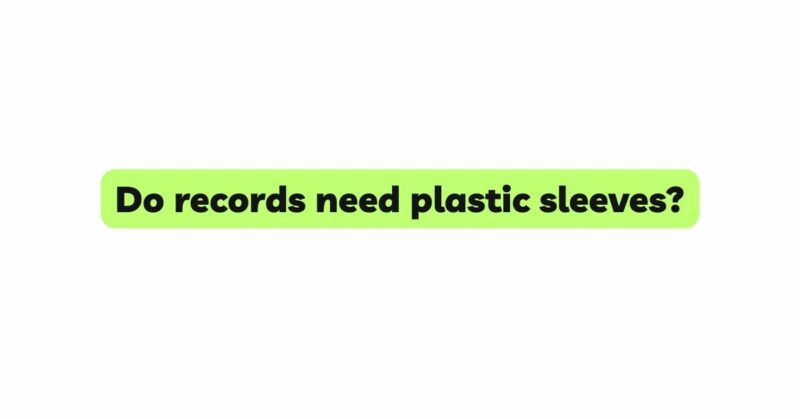As vinyl records continue to experience a resurgence in popularity, discussions about their care and preservation have become more relevant than ever before. One question that frequently arises among audiophiles and collectors is whether records need plastic sleeves for protection. While plastic sleeves have traditionally been used to shield records from dust and scratches, the environmental impact of plastic waste and the rise of sustainable alternatives have led many to question their necessity. In this article, we will explore the reasons behind the use of plastic sleeves, their impact on the environment, and alternative preservation methods that balance the preservation of vinyl records with sustainability.
The Importance of Record Protection
Vinyl records, beloved for their unique sound and nostalgic value, are sensitive audio mediums that require proper protection to maintain their quality and longevity. Dust and particles can accumulate on the surface of records and create pops and crackles during playback. Scratches and scuffs can damage the grooves, leading to a reduction in sound quality and the potential for skipping. Proper record storage and protection are essential for maintaining the pristine condition of records and preserving the vinyl experience.
The Role of Plastic Sleeves
Plastic sleeves have been the traditional choice for record collectors seeking a cost-effective and convenient way to protect their vinyl. These transparent polyethylene or polypropylene sleeves create a barrier against dust, moisture, and fingerprints, while still allowing the album artwork to be visible. Moreover, plastic sleeves are easy to use and replace, making them a popular choice for both casual listeners and serious collectors.
Environmental Concerns
While plastic sleeves offer excellent protection for records, they have significant environmental drawbacks. The production and disposal of plastic sleeves contribute to the global plastic waste problem, leading to environmental pollution and harm to wildlife. As we become increasingly aware of the urgent need for sustainable practices, many individuals and organizations are reevaluating the use of plastic products, including record sleeves.
Sustainable Alternatives
As concern about environmental impact grows, several sustainable alternatives to plastic sleeves have emerged. Some manufacturers now produce record sleeves made from recycled materials, reducing the reliance on virgin plastics. Additionally, there is a rising trend in the use of biodegradable and compostable sleeves made from materials like cornstarch and sugarcane. These alternatives aim to strike a balance between protecting records and minimizing environmental harm.
Outer Jacket vs. Inner Sleeve
Another point of discussion in the vinyl community is whether both the outer jacket and the inner sleeve need to be made of plastic. The outer jacket typically serves as the primary protection for the record and its artwork, while the inner sleeve directly covers the vinyl. Some argue that while the outer jacket may require sturdy material for protection, the inner sleeve can be made from alternative, more sustainable materials without compromising the record’s well-being.
Protective Inserts and Paper Sleeves
In addition to sustainable materials for inner sleeves, protective inserts are gaining popularity as an eco-friendly solution. Inserts made from acid-free paper or cardstock can prevent the record from slipping out of the sleeve, as well as offer additional protection from scratches. Similarly, paper sleeves, which were prevalent in the early days of vinyl, are making a comeback. These sleeves provide adequate protection against dust and scratches while being more environmentally friendly than plastic.
Care and Storage Practices
Regardless of the material used for sleeves, proper care and storage of records are crucial for their preservation. Storing records vertically and avoiding exposure to direct sunlight and extreme temperatures are essential practices to maintain their condition. Regular cleaning using anti-static brushes or cleaning machines can also help reduce dust and grime build-up.
The Role of Collectors and Industry
Record collectors, as passionate custodians of vinyl history, can play a significant role in promoting sustainable practices within the vinyl community. By choosing eco-friendly sleeves and advocating for responsible consumption, collectors can lead by example and encourage others to adopt environmentally conscious habits.
Moreover, the record industry itself can take steps towards sustainability by offering more eco-friendly packaging options, using recycled materials, and educating consumers about the environmental impact of their choices.
Conclusion
In conclusion, the use of plastic sleeves for vinyl records is a complex issue that involves balancing the need for preservation with environmental sustainability. While plastic sleeves have been the go-to choice for many years due to their convenience and affordability, their contribution to plastic waste has sparked discussions about more eco-friendly alternatives. As the vinyl community continues to grow and evolve, it is crucial for collectors, manufacturers, and enthusiasts to collaborate and find innovative solutions that protect the vinyl experience while being mindful of the planet’s well-being. Embracing sustainable alternatives, promoting responsible consumption, and adopting proper care and storage practices will ensure that the vinyl revival remains harmonious with the global call for environmental consciousness.


